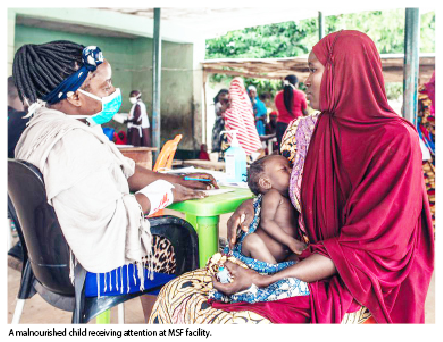Nigeria Seeks N3 Billion to Save 3 Million Children from Malnutrition Crisis

In Nigeria, a heartbreaking reality persists where many children are subjected to hardships and exploitation due to the dire lack of access to adequate nutrition and healthcare. Among these children, Kabiru, a symbol of hope at birth, had to confront insecurity and poverty from the outset. Despite all odds, Kabiru’s journey highlighted the pressing need for improved nutrition and healthcare access for children in similar situations.
The Impact of Maternal Nutrition
Expectant mothers, driven by their unwavering commitment to their unborn children, strive to provide essential minerals like iron and calcium. However, when circumstances force them to consume insufficient or inadequate diets, they have little to pass on to their babies. In Nigeria alone, a staggering 7.8 million pregnant women grapple with anemia, a condition stemming from such nutritional shortcomings.
Nigeria’s Alarming Malnutrition Statistics
Kabiru’s plight mirrors that of approximately three million malnourished children in Nigeria. Shockingly, Nigeria claims the unfortunate distinction of having the highest number of malnourished children in Africa and globally. UNICEF, recognizing malnutrition as an inexcusable global issue, emphasizes that no country can afford to turn a blind eye to this crisis.
The Widespread Consequences of Malnutrition
According to the World Health Organization (WHO), malnutrition exacts a heavy toll on healthcare costs, productivity, and economic growth. This vicious cycle perpetuates poverty and ill-health, casting a shadow over the nation’s future prospects. Within Nigeria, the malnutrition crisis encompasses a staggering 35 million children under the age of five, with 12 million suffering from stunted growth, three million facing acute wasting, and a staggering 23.5 million grappling with anemia.
The recently published 2023 Cadre Report paints a grim picture, revealing the presence of 17.7 million hungry individuals, among whom one million are battling acute food insecurity. Tragically, the nation has only seen a paltry average reduction of 1.4% in stunting each year. However, there is hope that a relatively modest investment of N11,000 (equivalent to $14) per child, or a total of N3 billion, could chart a brighter path for Nigeria’s future through impactful preventive measures.
A Call to Action
Former President of Ghana, John A. Kufour, reminds us of the significance of investing in nutrition, stressing that it yields significant and lasting socio-economic gains. His words echo the sentiment that by investing N11,000 per child, Nigeria could potentially save the lives of three million children affected by malnutrition.
UNICEF’s Nutrition Officer, Nkeiru Enwelum, passionately underscores the urgency of investments and funding in nutrition. She emphasizes that failure to prevent malnutrition in children, leading to issues like stunting, wasting, and underweight, can have long-lasting, irreversible effects on both cognitive and physical growth. The economic ramifications are also significant, with the loss estimated at N76 billion, equivalent to 15% of Nigeria’s GDP in 2023.
Enwelum points out that the estimated cost of a child’s nutritional needs is currently N11,000, or approximately five dollars per child per year. In contrast, treatment costs are nearly ten times higher than this amount, with vitamin A supplementation alone costing 0.44 dollars. With this investment, Nigerian children gain access to vital supplements, including zinc, vitamin A, and oral rehydration salts (ORS) for diarrhea, with an updated ORS supplement providing essential electrolytes.
Prevention vs. Treatment
Enwelum emphasizes the importance of prevention over treatment, noting that it costs a staggering $130 (N100,000) to treat acute malnutrition and severe acute malnutrition, which is ten times the cost of prevention. This highlights the need to prioritize preventive measures, considering that some malnourished children may not receive treatment, potentially leading to fatal outcomes or long-term consequences.
The Government’s Role
The UNICEF Nutrition Officer urges governments to increase funding for nutrition interventions and ensure the timely release of funds. She emphasizes that government expenditure on nutrition remains inadequate, with budgetary releases often falling short of allocations. There is an urgent need to integrate various sectors, including agriculture, environment, and water resources, into nutrition interventions to ensure a holistic approach.
A Looming Crisis
Despite the efforts being made, experts warn that the rising levels of multidimensional poverty in Nigeria could exacerbate malnutrition at all levels, given the current nationwide food insecurity. Malnutrition imposes substantial direct and indirect costs on the country, straining an already fragile economy. Therefore, as Nigeria prepares its forthcoming budget, the government must consider substantial investments in nutrition to offer a lifeline to its vulnerable children.



